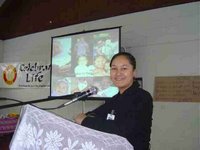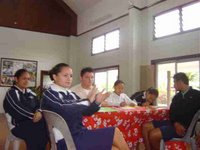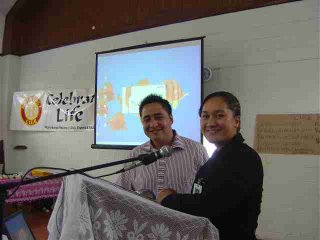Pukapuka Hostel, Rarotonga, Cook Islands
The Community Initiative Scheme,
Te Ipukarea Society
And
Rotaract Rarotonga
We wish to provide a place for youth to voice their opinions about the state of the environment in the Cook Islands. We would like to use this opportunity to enable TIS technical members to make presentations on the top environmental issues. Youth would then plan activities they can do to learn more about protecting the environment.
 Youth participants from Tereora Collage, Nukutere Collage, and various other youth groups and businesses on the island.
Youth participants from Tereora Collage, Nukutere Collage, and various other youth groups and businesses on the island.
Also speakers from the National Environment Service, Ministry of Marine Resources, Waste Management, and Te Ipukarea Society.
“Invasive Species”
Joseph Brider, Environment Officer, National Environment Service
Joseph talked about the invasive species present in the Cook Islands such as the Mynah bird and balloon vine. He discussed how invasive species spread and why they are so successful at surviving and growing in number. He explained how invasive species are set to increase because of increased travel and trade.

“Native, Historical and Significant Trees and Places, Puaikura” Vaine, Cook Islands Girl Guides
Vaine talked about a project the Cook Islands Girl Guides are doing to map and label important trees and historical places in Puaikura, Rarotonga. The Girl Guides plan to place the information on database and eventually website. They are hoping the trees can then be labeled and protected by Island Bylaw.

“Water Conservation”
Deyna Marsh, Environment Officer, National Environment Service
Deyna talked about what a watershed is and the activities that can affect the quality of water. Deyna also talked about the parameters measured to define the quality of water such as faecal coliform bacteria. She also discussed what can be done to purify water in the home and what can be done in the community to protect watersheds.
“Solid Waste” 
Tekao Herrmann, Director Waste Management (Engineer), Ministry of Works
Tekao’s theme was, Our Paradise Lets Not Waste It. His presentation was about the functions of the landfill, sewage treatment ponds, and the recycle centre. He also described how residents should manage their household rubbish. Plastic should be put into a shopping bag and any bottles should have their lids removed. Aluminum and tin should be in a separate bag and glass bottles in another bag.  “Marine Conservation”
“Marine Conservation”
Teina Tuatai, Fisheries Research Officer, Ministry of Marine Resources
Teina talked about coral reefs, what they are, their benefits to our community, and their importance to our culture and traditions. Teina then talked about the problems and issues facing coral reefs.
“The Role of NGO’s, Activism”
Jolene Bosanquet, Director, Spacific Marketing Ltd
Jolene, a life member of TIS and past President, based her presentation on the importance and role of an NGO. She talked about past and present projects she’s been involved with and encouraged the youth to play their part in protecting their environment.
“Biodiversity”
Ian Karika, Vice President, Te Ipukarea Society, Conservation Area Support Officer, Takitumu Conservation Area, Chairman, Rarotonga Island Environment Authority
Ian Karika spoke about Cook Islands Biodiversity and the functions of the Takitumu Conservation Area. He gave an in depth speech about terrestrial plants, endemic plants and animals and protected areas like Suwarrow.
 “A well spoken speech by Mr Karika”.
“A well spoken speech by Mr Karika”.
Group Work
Participants were divided into four groups and each group given a topic, either Solid Waste, Water Pollution, Plants and Trees or Animals. Each group listed environmental issues related to that topic on to one sheet of butcher paper. Then every participant in the forum was given a yellow sticker and a white sticker to stick on to each of the four butcher papers. The yellow sticker was for the issue that concerned them most and the white sticker was for the issue that concerned them second. Each group was then asked to list activities to address each of the eight issues. This resulted in eight pages of activities, each titled with a priority issue. Next, for each butcher paper every participant stuck a yellow sticker on the activity they wanted to do most and a white sticker on the activity they wanted to do second. This resulted in 16 activities and very good participatory prioritization.
Group work presentations by 2 different groups.
The results of the group discussions were as follows:
Group One Topic: Solid Waste
Group Name: “Wasted”
Priority Issue 1: Rubbish kills animals and plants
Priority Activity 1: Provide awareness to the community e.g. advertising bio-degradable bags, door to door awareness, advertising secure bagging of rubbish to avoid scavengers getting hurt or killed
Priority Activity 2: Increase the number of bins e.g. 1 bin for every 250 meters
Priority Issue 2: Rubbish doesn’t look good for tourism
Priority Activity 1: Have supermarkets issue paper bags rather than plastic bags because it is environmentally friendly
Priority Activity 2: Set up TV and radio adverts to inform people to be more responsible for their rubbish, start campaigns focusing on tourists e.g. backpackers
Group Two Topic: Plants and Trees 
Group Name: “Tiare Maori”
Priority Issue 1: Chemical wastes leaching through the soil, which absorbs and affects the growth of plants and trees
Priority Activity 1: Implement regulations/policies to ban harmful chemicals e.g. fertilizers
Priority Activity 2: Community awareness e.g. educating farmers/growers on the types of fertilizers to use on their plantations
Priority Issue 2: Deforestation e.g. cutting down trees for economic development
Priority Activity 1: Develop a support group to protect native trees and plants, include respected advocates e.g. aronga mana/ui ariki
Priority Activity 2: Negotiate with construction workers or architects to find alternative solutions for building e.g. build around native trees.
Group Three Topic: Water Pollution
Group Name: “Hydro’s”
Priority Issue 1: Sewage
Priority Activity 1: The government should tax resorts and use money to pay for a centralized sewage system
Priority Activity 2: Spread awareness e.g. TV, flyers etc.
Priority Issue 2: Animals bacteria in the water causes illnesses
Priority Activity 1: Develop some sort of filter system
Priority Activity 2: Develop community-monitoring teams to monitor stream banks “Welcome to the jungle”!
“Welcome to the jungle”! 
Group Four Topic: Animals
Group Name: “Totaraz”
Priority Issue 1: Human exploitation e.g. over-fishing
Priority Activity 1: Try to make laws and harsh consequences
Priority Activity 2: Public Education
Priority Issue 2: Destroying habitats e.g. building developments
Priority Activity 1: Create community initiatives such as planting trees and making coral gardens
Priority Activity 2: Incorporate environmental friendliness in our education system.
Highlights
Fun and Educational
Feedback through the evaluation sheets showed that the TIS Youth Environment Forum was fun and educational. The energizers were especially popular and a good way to break the ice. The students from the three schools showed mature enthusiasm, which made the forum run very smoothly. It was my pleasure to work with all the presenters and participants who also verbally indicated they enjoyed the forum very much.
Next steps
The next step will be to assemble the seven youth that paid their membership and joined TIS during the Forum. This core group could form the “Youth Committee” and can help to plan and organize future events and encourage other youth to join the organization. “Yep future ambassadors for our country”!!
“Yep future ambassadors for our country”!!
Acknowledgements
The Community Initiative Scheme – Thank you for your financial help which made the forum a success.
Rotaract Rarotonga - TIS thanks you also, for organizing the fundraiser and donating the balance of the funds needed to go towards the forum.
Avis Rent a Car – Thank you for the professional service.
Tereora College – Thank you Principal Waiti and Deputy Principal Unuka for allowing your students to participate.
Nukutere College – Thank you Principal Nahu for allowing your students to participate.
Imanuela Akatemia – Thank you Principal Nand for allowing your students to participate.
National Environment Service – Thank you Joseph Brider and Deyna Marsh for your presentations, support and professionalism.
Marine Resources – Thank you Teina Tuatai for your presentation, support and professionalism.
Waste Management – Thank you Tekao for your presentation, support and professionalism.
Girl Guides – Vaine thank you for sharing your presentation with all of us at the forum.
Te Ipukarea Society – Thank you to Jolene and Ian for your wisdom, encouragement and support during the two-day forum.
 “Time for a lil sugar hit”! (Sprung man!!)
“Time for a lil sugar hit”! (Sprung man!!) “Put your hands in the air if you consider yourself a monkey”!! (ha-ha-ha)
“Put your hands in the air if you consider yourself a monkey”!! (ha-ha-ha)


No comments:
Post a Comment